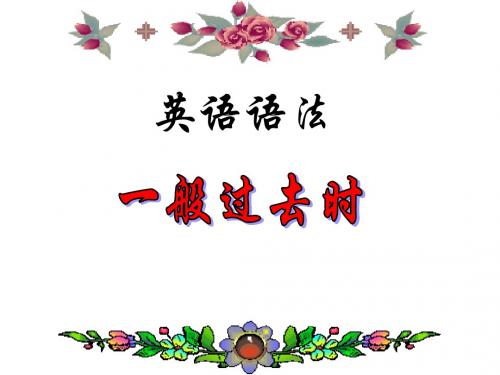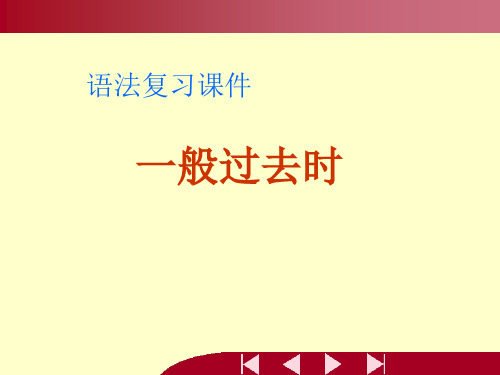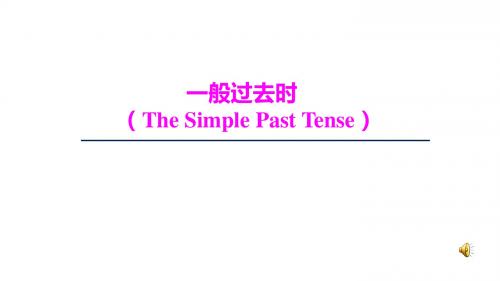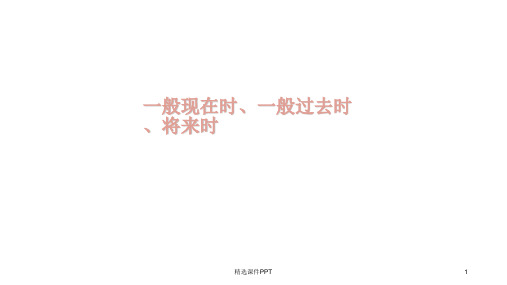七年级英语下 一般过去时1 (ppt)
合集下载
初中英语人教版七年级下册微课课件

A: What did ___ you do yesterday? B: I _____ went to the movie.
A: What did ___ you do last weekend? B: I did ___ my homework.
What did you do ___ last weekend? We ____________________ visited the fire station. How was ___ your trip last weekend? It was boring. do last weekend? What did they ___ Theypicked ______________________ some strawberries. How were ____ the strawberries? They were delicious.
地点 Where did she work last year?
主语 Who worked in a hospital last year?
every day yesterday
• I get home at 5:00 every day. I got home at 5:00 yesterday. • Jack sees a movie every day. Jack saw a movie yesterday. • She buys lunch in the shop every day. She bought lunch in the shop yesterday. • There are many people in our school every day. There were many people in our school yesterday.
一般过去时(7张PPT)初中英语专项复习课件

易错点:
稿定PPT
(1)表示一系列的动作,尽管有先后,都稿用定一PP般T过,去海时量,素最材后持两续个动词之间用and连结。 He opened the door, rushed out and then disa更 总pp新 有ea, 一red上 款. 他千 适打款 合开模 你门板,选冲择了出去,然后就消失了。 (2)注意在语境中理解"我刚才/原来还不……"。
感谢观看
一般过去时 初中英语专项复习
一般过去时 构成:一般过去时用动词的过去式构成,其规则动词变化方法如下表所示:的状态。
情况 一般情况 以不发音的字母e结尾
以辅音字母 +y结尾
结尾只有一个辅音字母的重 读闭音节
构成方法
例词
加-ed
wash→washed help→helped
稿加定-PdPT
hope→hoped like→liked
一般过去时 (5)一般过去时有时可以表示现在,多与 want, hope, wonder, think, intend 等动词连用,使语气更委婉 。
I wondered if you could help me. 不知你能不能帮我一下。 有时用一般过去时也是时态一致的需要。 I didn’t know you were here. 我不知道你在这里。
He was here just now. 他刚才还在这里。 What did you do yesterday? 你昨天做了什么事?
(2)在过去一段时间内的经常性或习惯性稿动定作PP。T 稿定PPT,海量素材持续
We often played together when we were child更re新n.,我上们千小款时模候板常选在择一起玩。 总有一款适合你
一般过去时、过去进行时、过去完成时(课堂PPT)

2、表示过去经常或反复发生的动作。 My father often went to work by bus last year. When I was a child, I often listened to music.
3
常用时间 常与一般过去时态连用的时间有:
yesterday yesterday morning (afternoon, evening…) last night (week, month, year…) two days ago, a week ago, three years ago… in 1990, (in 1998…)
C. has just stared D. had just stared 18
5.I first met Lisa three years ago. She ___ at a radio shop at the time.
A. has worked
B. was working
C. had been working D. had worked
指当时一时的表现12一般过去时与过去进行时的区别1一般过时往往表示某一动作已经完成而过去进行时却表示动作在持续或未完成
一般过去时
1
一般过去时
知识结构
构成 用法 常用时间
动词的过去式
1、表示过去某个时 间发生的动作或 存在的状态。
2、表示过去经常或 反复发生的动作。
yesterday
last night
in 1990
two days ago
2
用法 1、表示过去某个时间发生的动作或存在的状态。
He was here yesterday. I got up at six thirty yesterday morning. My father was at work yesterday afternoon. Did you have a good time last summer?
3
常用时间 常与一般过去时态连用的时间有:
yesterday yesterday morning (afternoon, evening…) last night (week, month, year…) two days ago, a week ago, three years ago… in 1990, (in 1998…)
C. has just stared D. had just stared 18
5.I first met Lisa three years ago. She ___ at a radio shop at the time.
A. has worked
B. was working
C. had been working D. had worked
指当时一时的表现12一般过去时与过去进行时的区别1一般过时往往表示某一动作已经完成而过去进行时却表示动作在持续或未完成
一般过去时
1
一般过去时
知识结构
构成 用法 常用时间
动词的过去式
1、表示过去某个时 间发生的动作或 存在的状态。
2、表示过去经常或 反复发生的动作。
yesterday
last night
in 1990
two days ago
2
用法 1、表示过去某个时间发生的动作或存在的状态。
He was here yesterday. I got up at six thirty yesterday morning. My father was at work yesterday afternoon. Did you have a good time last summer?
初一英语语法:一般过去时(共22张PPT)

cost →cost花钱
read→read读书
cut → cut 砍,剪 hurt → hurt受伤
2)变元音字母为a run→ran跑
give→gave给 sing→sang唱歌
come → came过来 drink→drank喝 swim→swam游泳
sit→sat坐下 begin→began开始
feel build fight give teach sing buy cut come draw drink drive hope use start
felt built fought gave taught sang bought cut came drew drank drove hoped used started
2. watch, John, did, TV, weekend, last. _J_o_h_n_d_i_d_w_a_t_ch__T_V_l_as_t_w_e_e_k_e_n_d_. ___________
3. went, I ,to, by, park, a, bike
_____I _w_e_n_t_t_o__a_p_a_r_k_b_y__b_ik_e__. ___________ 4. jumped, the, into, lake, he, and, the, to, swam, kite.
19) My sister _w_a__s_ (be) born on June 5. 1996. 20) W__e_r_e_ (be) your parents at home just now? 21) He _s_tu__d_ie_d_ (study) French here last year. 22) She __d_i_d_ (do) homework last night. 23) They _w__e_n_t(go) to the zoo yesterday morning. 24) We __h_a_d_ (have) a party last Saturday. 25) Joy _v_is_i_te__d (visit) me yesterday evening. 26) They __l_iv_e_d_ (live) here two years ago. 27) He _w__a_s_(be) here a moment ago.
英语一般过去时PPT课件

live hope use
lived hoped used
6
3.重读闭音节词, 先双写这个辅音字母,再加—ed
stop plan
stopped planned
7Байду номын сангаас
4. 以“辅音字母+y”结尾的词, 先变“y”为“i”再加—ed
study worry
studied wd orrie
8
不规则动词 过去式的构成
was were did
went had made got
eat
say see stand find
ate
said saw stood found
18
Play Played
19
use used
20
plan planned
21
study studied
22
worry worried
23
stop stopped
一般过去时第一讲 动词变过去式
past no w
futur e
2
动词过去式 的构成
规则动词
regular verbs
不规则动词
irregular verbs
3
规则动词 过去式的构成
1、一般在动词末尾加– ed
look play start
looked played started
5
2、结尾是 e 的动词只加 -- d
否定句: →She didn’t play the violin last night.
肯定句: They swam in the lake yesterday.
否定句: →They didn’t swim in the lake yesterday.
初中英语-一般过去时-教学省公开课获奖课件说课比赛一等奖课件

They weren’t happy last night.
16
一般疑问句
在句首加上 Did,动词变为原形,其他不变。如: Did Li Ming bobuugyht a book on Monday.?
肯定回答: Yes,… did. 否定回答: No,… didn’t. 有be动词存在旳句子,将was / were 放在句首,其他位置不变。
如: It was hot yesterday. 变为: Was it hot yesterday?
肯定回答: Yes,… was/were. 否定回答: No,… wasn’t / weren’t.
17
特殊疑问句
疑问词+did+主语+动词原形+其他
Where did you go last weekend? What did you do there? Who did you go with? When did you get home? How did they go to the cinema?
再加 –ed,如: stop---stopped 5. 不规则动词旳过去式变化规律性不强,需多加记忆,如:
go---went, get---got, buy---bought 等
9
04
常用时间状语
10
常用时间状语
last week tomorrow yesterday often two years ago sometimes at this weekend now usually
疑问词+was/were+主语+其他 Where were you last night?
18
Summary
16
一般疑问句
在句首加上 Did,动词变为原形,其他不变。如: Did Li Ming bobuugyht a book on Monday.?
肯定回答: Yes,… did. 否定回答: No,… didn’t. 有be动词存在旳句子,将was / were 放在句首,其他位置不变。
如: It was hot yesterday. 变为: Was it hot yesterday?
肯定回答: Yes,… was/were. 否定回答: No,… wasn’t / weren’t.
17
特殊疑问句
疑问词+did+主语+动词原形+其他
Where did you go last weekend? What did you do there? Who did you go with? When did you get home? How did they go to the cinema?
再加 –ed,如: stop---stopped 5. 不规则动词旳过去式变化规律性不强,需多加记忆,如:
go---went, get---got, buy---bought 等
9
04
常用时间状语
10
常用时间状语
last week tomorrow yesterday often two years ago sometimes at this weekend now usually
疑问词+was/were+主语+其他 Where were you last night?
18
Summary
讲解(一般过去时)ppt课件

4
句型变化 1.系动词be
陈述句(肯定): She was a doctor two years ago. 陈述句(否定): She was not a doctor two years ago. 一般疑问句: Was she a doctor two years ago?
肯定回答:Yes, she was. 否定回答:No, she wasn’t. 特殊疑问句: When was she a doctor?
5
动词一般过去时,表示过去发生的事; be用was或用were, have,has变had; 谓语动词过去式,过去时间坐标志; 一般动词加-ed,若是特殊得硬记。 否定句很简单,主语之后didn’t添; 疑问句也不难,did放在主语前; 如果谓语之前有did,谓语动词需还原; 动词若是was,were,否定就把not添。
• 为什么她去年离开了学校? Why did she leave the 时
• 1.定义: 1)表示过去某个时间发生的动作或存在的状态,常和 表示过去的时间状语连用;2)也表示过去经常或反复发生的动 作,常和表示频度的时间状语连用。
• 标志性状语
2.时间状语:yesterday last night
6
7
8
• 1. look • 4. carry • 7. call • 10.like • 13.dance • 16.stay
2. live 5. hope 8. finish 11.play 14.cry 17.cook
3. stop 6. trip 9. want 12.watch 15.plan 18.invent
3. _____________________ on Sundays. They went to the park last Monday.
句型变化 1.系动词be
陈述句(肯定): She was a doctor two years ago. 陈述句(否定): She was not a doctor two years ago. 一般疑问句: Was she a doctor two years ago?
肯定回答:Yes, she was. 否定回答:No, she wasn’t. 特殊疑问句: When was she a doctor?
5
动词一般过去时,表示过去发生的事; be用was或用were, have,has变had; 谓语动词过去式,过去时间坐标志; 一般动词加-ed,若是特殊得硬记。 否定句很简单,主语之后didn’t添; 疑问句也不难,did放在主语前; 如果谓语之前有did,谓语动词需还原; 动词若是was,were,否定就把not添。
• 为什么她去年离开了学校? Why did she leave the 时
• 1.定义: 1)表示过去某个时间发生的动作或存在的状态,常和 表示过去的时间状语连用;2)也表示过去经常或反复发生的动 作,常和表示频度的时间状语连用。
• 标志性状语
2.时间状语:yesterday last night
6
7
8
• 1. look • 4. carry • 7. call • 10.like • 13.dance • 16.stay
2. live 5. hope 8. finish 11.play 14.cry 17.cook
3. stop 6. trip 9. want 12.watch 15.plan 18.invent
3. _____________________ on Sundays. They went to the park last Monday.
英语语法——一般过去时课件(共44张PPT)

例:Wendy was in the seventh grade last year. Was Wendy in the seventh grade last year?
肯否回答:
一般疑问句: Be动词(was/were)+主语+其他+?
肯定回答:Yes , 主语+ was/were. 否定回答:No , 主语+ wasn’t/weren’t . --- Was he at home yesterday ? ---他昨天在家吗? --- Yes , he was .是的,他在 --- No , he wasn’t . 不,他不在。
study — studied
carry— carried
5.不规则变化. (见不规则动词表P97)
be动词 的一般过去时
Please look at the sentences
我今年12岁. I _a_m_ 12 years old this year.
我去年11岁. I _w_a_s_ 11 years old last year.
实意动词的一般 过去时句子结构
每天,早餐我吃鸡蛋和牛奶。 I _h_av_e_ eggs and milk for breakfast every morning.
昨天,早餐我吃面条。
I _h_a_d_ noodles for breakfast yesterday morning.
他每天都吃水果。 He _h_a_s__ fruit every day.
1. I _______ at school now.
was 2. He ________ at the camp last week. were 3. We ________ students two years ago. were 4. They ________ on the farm a moment ago. was 5. Yang Ling ________ eleven years old last year. was 6. There ________ an apple on the plate yesterday. was 7. There ________ some milk in the fridge yesterday. was 8. The mobile phone _______ on the sofa yesterday evening.
肯否回答:
一般疑问句: Be动词(was/were)+主语+其他+?
肯定回答:Yes , 主语+ was/were. 否定回答:No , 主语+ wasn’t/weren’t . --- Was he at home yesterday ? ---他昨天在家吗? --- Yes , he was .是的,他在 --- No , he wasn’t . 不,他不在。
study — studied
carry— carried
5.不规则变化. (见不规则动词表P97)
be动词 的一般过去时
Please look at the sentences
我今年12岁. I _a_m_ 12 years old this year.
我去年11岁. I _w_a_s_ 11 years old last year.
实意动词的一般 过去时句子结构
每天,早餐我吃鸡蛋和牛奶。 I _h_av_e_ eggs and milk for breakfast every morning.
昨天,早餐我吃面条。
I _h_a_d_ noodles for breakfast yesterday morning.
他每天都吃水果。 He _h_a_s__ fruit every day.
1. I _______ at school now.
was 2. He ________ at the camp last week. were 3. We ________ students two years ago. were 4. They ________ on the farm a moment ago. was 5. Yang Ling ________ eleven years old last year. was 6. There ________ an apple on the plate yesterday. was 7. There ________ some milk in the fridge yesterday. was 8. The mobile phone _______ on the sofa yesterday evening.
一般现在时现在进行时一般过去时-PPT

go
+ing
ask
以不发音得e结尾得,去 e,+ing
write take
重读闭音节以一个辅音 字母结尾得,双写这一 字母+ing
get run swim
going asking
writing taking
getting running swimming
现在进行时:
(The Present
现在正在进行得动作
every year(每年)
once a week (一周一次)
twice a year(一年两次)
Let’s remember:
Do you remember the words in your life? 您记得您生活中得一些常用词汇吗?
起床 吃早饭 上课 吃午饭 休息 做运动 吃晚餐 做家庭作业 瞧电视 上床睡觉
定义: 一般现在时:1、表达经常性或习惯性得动作。
2、表示现在得状态。 例如: 1、我们每天都上学。
We go to school every day、
2、下课后我们打扫教室。
We clean the classroom after class、
3、有时我们在操场上踢足球 。
We sometimes play football
其否定形式一般就是在谓语动词前 don’t,一般疑问句在句前加do
但当主语就是第三人称单数时,谓语动词形式有变化,一般在动词
末尾加s,否定句在行为动词前加doesn’t, 一般疑问句在句前加 does 动词三单得变化: 1、一般动词后加s,如:reads,plays,works,makes 2、以 s,x,ch,sh, 结尾,后加es、 如:watches, 3、以辅音字母加o结尾,一般加es ,如:does,goes 4、辅音字母+y结尾得单词,去y,加ies,如:worries
人教版七年级下语法教学:一般过去时(Present SimpleTense)课件(共23张ppt)

B: I … A: Oh, sounds great! B: I a...because my mother ….
I love her so much.
Past tense 过去式
regular change 规则变化
原形 过去式wasຫໍສະໝຸດ -__w__a_s_h__e_d__
love-__lo__v_e_d_ stop-__s_t_o_p__p_e_d_worry-__w__o_r_r_ie_ d
She taught me many things when I was little. She helped me with schoolwork when I began my schoolwork. She looked after me so well that I could grow up well. She did quite a lot of these things Just because she loved me.
He/She was really .... He/She taught me .... He/she also helped me.... For me, he/she made me.... .... I am really thankful to him/her.
grandpa, grandma, dad, mom, teacher, friend, volunteer…
On Mother’s last month, students did quite a lot of things for their mothers. Some students in our class ___d_id__a lot of things for mothers. Gina __b_o_u_g_h_t_(buy) a bunch(束) of carnations. Tom ____m__a_d_e___(make) a card by himself. Cathy thinks her mother works too hard, so she _c_le_a_n_e_d_(clean) the living room and __w__a_s_h_ed (wash) the dishes. But only Jimmy ____d__id_n_’_t _d_o__ (not do) anything. He __d_i_d_n_’t_d__ec_i_d_e__(not decide) what to do. All of us hope that our mothers will like these gifts.
I love her so much.
Past tense 过去式
regular change 规则变化
原形 过去式wasຫໍສະໝຸດ -__w__a_s_h__e_d__
love-__lo__v_e_d_ stop-__s_t_o_p__p_e_d_worry-__w__o_r_r_ie_ d
She taught me many things when I was little. She helped me with schoolwork when I began my schoolwork. She looked after me so well that I could grow up well. She did quite a lot of these things Just because she loved me.
He/She was really .... He/She taught me .... He/she also helped me.... For me, he/she made me.... .... I am really thankful to him/her.
grandpa, grandma, dad, mom, teacher, friend, volunteer…
On Mother’s last month, students did quite a lot of things for their mothers. Some students in our class ___d_id__a lot of things for mothers. Gina __b_o_u_g_h_t_(buy) a bunch(束) of carnations. Tom ____m__a_d_e___(make) a card by himself. Cathy thinks her mother works too hard, so she _c_le_a_n_e_d_(clean) the living room and __w__a_s_h_ed (wash) the dishes. But only Jimmy ____d__id_n_’_t _d_o__ (not do) anything. He __d_i_d_n_’t_d__ec_i_d_e__(not decide) what to do. All of us hope that our mothers will like these gifts.
人教版英语七年级下一般过去时课件

• 根据同学们读的句子判断时态,如 果是一般过去时,你就鼓掌
• 如果不是,你就哈哈大笑!
今天你学会了吗?
综合测验:
• 1.How is Jane yesterday? (改错) • 2.He go to school by bus last week (改错) • 3.He goes home at 6:00 last month. (改错) • 4. The children had a good time in the park.(变否定句) • 5 Last week I read an English book.(变一般疑问句) • 6 My brother was in the park just now.(对划线部分提问) • 7 I (do) my homework yesterday morning.(用正确形式填空) • 8 My brother (go ) to study in America last year. • 9 Did you go (visit) your uncle yesterday? • 10 We (take ) the train to Shanghai yesterday.
went
Infinitive put come do write sit take eat find
Past tense put came did wrote sat took ate found
用法
判断时态
He was 11 years old last year.
I went to the movies yesterday.
请把上列两个句子变为 否定句:
He was not 11 years old last year.
• 如果不是,你就哈哈大笑!
今天你学会了吗?
综合测验:
• 1.How is Jane yesterday? (改错) • 2.He go to school by bus last week (改错) • 3.He goes home at 6:00 last month. (改错) • 4. The children had a good time in the park.(变否定句) • 5 Last week I read an English book.(变一般疑问句) • 6 My brother was in the park just now.(对划线部分提问) • 7 I (do) my homework yesterday morning.(用正确形式填空) • 8 My brother (go ) to study in America last year. • 9 Did you go (visit) your uncle yesterday? • 10 We (take ) the train to Shanghai yesterday.
went
Infinitive put come do write sit take eat find
Past tense put came did wrote sat took ate found
用法
判断时态
He was 11 years old last year.
I went to the movies yesterday.
请把上列两个句子变为 否定句:
He was not 11 years old last year.
七年级下一般过去时复习课件

He walked to school yesterday. He didn’t walk to school yesterday. Did he walk to school yesterday?
肯定回答:Yes, he did. 否定回答:No, he didn’t.
1.一般动词词尾加—ed
walk— walked
• 6. The students played football just now.(刚才) 否定句:
• 一般疑问句: • 肯定回答: • 否定回答:
• 划线提问:
• 6. The students played football just now.(刚才)
否定句:
• The students didn’t play football just now. • 一般疑问句: • Did the students play football just now? • 肯定回答:Yes, they did. • 否定回答:No, they didn’t. • 划线提问: • What did the students do just now?
• 8. He had an egg for breakfast this morning.
否定句:
• 一般疑问句: • 肯定回答: • 否定回答: • 划线提问:
He was at home yesterday. I got up at six thirty yesterday morning. I visited my aunt last weekend.
2、表示过去经常或反复发生的动作。
My father often went to work by bus last year. When I was a child, I often listened to music.
肯定回答:Yes, he did. 否定回答:No, he didn’t.
1.一般动词词尾加—ed
walk— walked
• 6. The students played football just now.(刚才) 否定句:
• 一般疑问句: • 肯定回答: • 否定回答:
• 划线提问:
• 6. The students played football just now.(刚才)
否定句:
• The students didn’t play football just now. • 一般疑问句: • Did the students play football just now? • 肯定回答:Yes, they did. • 否定回答:No, they didn’t. • 划线提问: • What did the students do just now?
• 8. He had an egg for breakfast this morning.
否定句:
• 一般疑问句: • 肯定回答: • 否定回答: • 划线提问:
He was at home yesterday. I got up at six thirty yesterday morning. I visited my aunt last weekend.
2、表示过去经常或反复发生的动作。
My father often went to work by bus last year. When I was a child, I often listened to music.
初中英语一般过去时课件(PPT)

他昨天在上海。
I ____ 11 years old last year.
他现在在北京。
I ___ 12 years old this year.
我今年12岁.
他们今天在中国。
They ____ in China today.
They ____ in Japan yesterday.
他们昨天在日本。
Do you go to school on foot every day? ___ you __ to school on foot yesterday.
Does he go to school by bus every day? ___ he ___to school by bus yesterday?
动词原形、第三人称单数
动词过去式
got
played
They don’t watch TV in the evening. They _________ TV last night.
She doesn’t play basketball after school. She _________ basketball after school yesterday.
常用时间
与ago 连用: a moment two minutes three hours five days one week six months four years
01
ago
02
用于一般过去时的时间状语
last
time night week month year Monday
yesterday
____ they _____ their work at four? Yes, they _____. No, they _____.
I ____ 11 years old last year.
他现在在北京。
I ___ 12 years old this year.
我今年12岁.
他们今天在中国。
They ____ in China today.
They ____ in Japan yesterday.
他们昨天在日本。
Do you go to school on foot every day? ___ you __ to school on foot yesterday.
Does he go to school by bus every day? ___ he ___to school by bus yesterday?
动词原形、第三人称单数
动词过去式
got
played
They don’t watch TV in the evening. They _________ TV last night.
She doesn’t play basketball after school. She _________ basketball after school yesterday.
常用时间
与ago 连用: a moment two minutes three hours five days one week six months four years
01
ago
02
用于一般过去时的时间状语
last
time night week month year Monday
yesterday
____ they _____ their work at four? Yes, they _____. No, they _____.
仁爱英语七年级下册语法讲解一般现在时现在进行时及一般过去时PPT课件

e.g. My father was at work yesterday afternoon. He always went to work by bus last year. I was born in 1990. What did you do yesterday? They were in Beijing a week ago. I played football last night.
e.g. I go to school every day. He is always like that. Where do you live? What do you do here?
一般现在时的构成形式有: 肯定句, 疑问句, 否定句, 疑问否定式
动加-s.
动词的类别
(根据其在句中的功能)
③情态动词(表示能力,义务,必要,猜测等说话人 的语气或情态。情态动词只能和动词原形一起构成谓 语动词。) can、may、could、need、must、shoud
④系动词(后跟形容词构成系表结构)
look、taste、smell、feel、get、become
⑤实义动词(行为)动词(有完整的词义,并能单独 作谓语)
play—plays, want—wants, know—knows, help—helps
②以s, x, ch, sh, o结尾加-es.
guess—guesses teach—teaches brush—brushes , go—goes, do—does, watch—watches
③以“辅音+y “结尾变y 为i再加-es.
及物动词后面必须跟宾语 buy, catch, invent, found, like,
一般过去时(复习)公开课PPT课件

一般情况下,动词词尾加-ed,如: work—worked。
以辅音字母+y结尾的动词,把y变为i 再加-ed,如:study—studied。
以不发音的e结尾的动词,动词词尾 加-d,如:live—lived。
以一个辅音字母结尾的重读闭音节动 词,双写词尾辅音字母,再加-ed, 如:stop—stopped。
创造英语环境
在日常生活中尽量使用英 语,提高英语的实际运用 能力。
鼓励学生在日常生活中运用一般过去时
记录日常活动
用英语记录自己一天的活 动,使用一般过去时描述 过去发生的事情。
讲述经历
和同学或家人分享自己的 经历,使用一般过去时讲 述故事。
看图说话
选择一张图片,使用一般 过去时描述图片中的人物 和事件。
通过给出句子和选项,让学生选择正确的动词过去式完成句子。
改写句子
提供现在时的句子,要求学生将其改写为一般过去时。
连词成句
给出打乱顺序的单词,让学生重新排列并加上适当的标点符号,形 成语法正确、意思完整的句子。
小组讨论并分享经验
分组讨论
学生分组,每组围绕一个与一般过去时相关的话题展开讨论,如“你昨天做了什 么?”或“你曾经去过哪些地方?”。
常见误区及注意事项
不规则动词的过去式需要特殊记忆,不能简单地加-ed,如:go—went, eat—ate等。
在使用一般过去时时,要注意动词的过去式与过去分词的区分,避免混 淆。
在表达过去发生的动作时,要注意时间状语的正确使用,确保时态的一 致性。
03
一般过去时在句子中运用
陈述句中使用一般过去时
讲解一般过去时在各种句式中的 表达方式,如肯定句、否定句、 疑问句等,并给出相应的例句。
以辅音字母+y结尾的动词,把y变为i 再加-ed,如:study—studied。
以不发音的e结尾的动词,动词词尾 加-d,如:live—lived。
以一个辅音字母结尾的重读闭音节动 词,双写词尾辅音字母,再加-ed, 如:stop—stopped。
创造英语环境
在日常生活中尽量使用英 语,提高英语的实际运用 能力。
鼓励学生在日常生活中运用一般过去时
记录日常活动
用英语记录自己一天的活 动,使用一般过去时描述 过去发生的事情。
讲述经历
和同学或家人分享自己的 经历,使用一般过去时讲 述故事。
看图说话
选择一张图片,使用一般 过去时描述图片中的人物 和事件。
通过给出句子和选项,让学生选择正确的动词过去式完成句子。
改写句子
提供现在时的句子,要求学生将其改写为一般过去时。
连词成句
给出打乱顺序的单词,让学生重新排列并加上适当的标点符号,形 成语法正确、意思完整的句子。
小组讨论并分享经验
分组讨论
学生分组,每组围绕一个与一般过去时相关的话题展开讨论,如“你昨天做了什 么?”或“你曾经去过哪些地方?”。
常见误区及注意事项
不规则动词的过去式需要特殊记忆,不能简单地加-ed,如:go—went, eat—ate等。
在使用一般过去时时,要注意动词的过去式与过去分词的区分,避免混 淆。
在表达过去发生的动作时,要注意时间状语的正确使用,确保时态的一 致性。
03
一般过去时在句子中运用
陈述句中使用一般过去时
讲解一般过去时在各种句式中的 表达方式,如肯定句、否定句、 疑问句等,并给出相应的例句。
一般过去时ppt课件

16
行为动词的一般过去时
(1)肯定句 :主语+动词的过去式+… He played tennis last week.
(2) 否定句 : 主语 +did not+ V原形 +… week.
He did not play tennis last
(3)一般疑问句 :Did + 主语 + V原形 +….. Did he play tennis last week ?
He wasn’t…
一般疑问句 Is he …?
Was he…?
特殊疑问句 疑问词+is he … ? 疑问词+was he …?
12
• 名词变复数(第3人称单数),过去式,V-ing 形式, • “y”后变化口诀:
“元音字母+y” , 直接加, “辅音字母+y,” 去掉它 , “y后面的-ing,” 随便加。
餐我吃面条。)
didn’t have
I did not have eggs and milk for breakfast yesterday
morning.(昨天早餐我没吃面条。)
He did his homework yesterday evening.(昨天晚上他做家庭 作业。)
He did not do his homework yesterday evening.
22
Li Ming studied English this morning.
(变成一般疑问句)
Did LiMing study English this morning ? (李明今天早晨学英语了吗?)
Did LiMing studied English this morning? 行为动词用原形
行为动词的一般过去时
(1)肯定句 :主语+动词的过去式+… He played tennis last week.
(2) 否定句 : 主语 +did not+ V原形 +… week.
He did not play tennis last
(3)一般疑问句 :Did + 主语 + V原形 +….. Did he play tennis last week ?
He wasn’t…
一般疑问句 Is he …?
Was he…?
特殊疑问句 疑问词+is he … ? 疑问词+was he …?
12
• 名词变复数(第3人称单数),过去式,V-ing 形式, • “y”后变化口诀:
“元音字母+y” , 直接加, “辅音字母+y,” 去掉它 , “y后面的-ing,” 随便加。
餐我吃面条。)
didn’t have
I did not have eggs and milk for breakfast yesterday
morning.(昨天早餐我没吃面条。)
He did his homework yesterday evening.(昨天晚上他做家庭 作业。)
He did not do his homework yesterday evening.
22
Li Ming studied English this morning.
(变成一般疑问句)
Did LiMing study English this morning ? (李明今天早晨学英语了吗?)
Did LiMing studied English this morning? 行为动词用原形
人教版七年级英语下册 Unit12 一般过去时(The Simple Past Tense)(共23张PPT)

3.She stayed there for a week.(对划线部分提问) _H__o_w_ _lo_n_g__ __d_id___ she _s_ta_y__ there?
Dear Bill, How __w_a_s_ (is) your last weekend? __D_i_d_ (Do) you __h_a_v_e__(have) a good time? I _h_a_d__(have) an interesting weekend. I _t_o_o_k_(take) a bus to my grandparents’ home. I h__el_p_e_d_ (help) them __cl_e_a_n_ (clean) the house. After that, I _co_o_k__ed_ (cook) lunch for them. In the afternoon, we _____ (ttoaokke) a walk in the park.
Jim
Homework
Make up a story. Each student adds a
LassetnwteenkceI .
visited my aunt’s house.
The weather was
beautiful.
We went fishing.
was
were
What did they do last weekend?
Tony
Mike
Mary
climbed the mountain played soccer did her homework
Amy
Bill
Jack
had a picnic
went fishing
Dear Bill, How __w_a_s_ (is) your last weekend? __D_i_d_ (Do) you __h_a_v_e__(have) a good time? I _h_a_d__(have) an interesting weekend. I _t_o_o_k_(take) a bus to my grandparents’ home. I h__el_p_e_d_ (help) them __cl_e_a_n_ (clean) the house. After that, I _co_o_k__ed_ (cook) lunch for them. In the afternoon, we _____ (ttoaokke) a walk in the park.
Jim
Homework
Make up a story. Each student adds a
LassetnwteenkceI .
visited my aunt’s house.
The weather was
beautiful.
We went fishing.
was
were
What did they do last weekend?
Tony
Mike
Mary
climbed the mountain played soccer did her homework
Amy
Bill
Jack
had a picnic
went fishing
初中英语语法 一般现在时、过去时、将来时完整ppt课件

egtwoplusfourmoongoesaround经常性习惯性的动作经常性习惯性的动作目前的爱好能力目前的爱好能力客观事实客观事实动词三单形式规则变法
一般现在时、一般过去时 、将来时
精选课件PPT
1
Let's distinguish!
1. He does his homework every day. 2. I am a teacher. 3. We played the piano last Sunday. 4. They were at school just now.
going to 多用于自己打算、计划或有意做某事。
• 二、探究:
•1、动词come/go/leave/move/arrive/start等不和be going to连用,常用be
coming/going/leaving/moving/arriving/starting等来表示即将发生或安排好要做
的事。
---I ______ to the Great Wall.
A. go B. went
C. will go D. have gone
精选课件PPT
11
一一.一般般将将来来时时是(S表im示p从le现在fu开tu始re将t来en要s发e)生的事。
二.肯定句构成: 1. be going to do sth. 2. will / shall do sth.
Yes, they were.
No, they weren’t.
He could swim at the age of ten.
He couldn’t swim at the age of ten.
It took two hours to go there.
一般现在时、一般过去时 、将来时
精选课件PPT
1
Let's distinguish!
1. He does his homework every day. 2. I am a teacher. 3. We played the piano last Sunday. 4. They were at school just now.
going to 多用于自己打算、计划或有意做某事。
• 二、探究:
•1、动词come/go/leave/move/arrive/start等不和be going to连用,常用be
coming/going/leaving/moving/arriving/starting等来表示即将发生或安排好要做
的事。
---I ______ to the Great Wall.
A. go B. went
C. will go D. have gone
精选课件PPT
11
一一.一般般将将来来时时是(S表im示p从le现在fu开tu始re将t来en要s发e)生的事。
二.肯定句构成: 1. be going to do sth. 2. will / shall do sth.
Yes, they were.
No, they weren’t.
He could swim at the age of ten.
He couldn’t swim at the age of ten.
It took two hours to go there.
- 1、下载文档前请自行甄别文档内容的完整性,平台不提供额外的编辑、内容补充、找答案等附加服务。
- 2、"仅部分预览"的文档,不可在线预览部分如存在完整性等问题,可反馈申请退款(可完整预览的文档不适用该条件!)。
- 3、如文档侵犯您的权益,请联系客服反馈,我们会尽快为您处理(人工客服工作时间:9:00-18:30)。
一般过去时
知识结构
动词的过去式
构成
一般过去时
用法
1.表示过去某个时 间发生的动作或 存在的状态。 2.表示过去经常或 反复发生的动作。
常用时间
yesterday last night in 1990 two days ago
构成 规则动词 动词过去式 的构成 不规则动词 读音
规则动词过去式的构成 构成规则 1. 一般在动词原形末尾加-ed look play start live hope use stop plan trip 例词 looked played started lived hoped used stopped planned tripped studied carried
3、She stayed there for a week.(对划线部分提问)
______ How ______ long _____ did she _____ stay there?
4、There was some orange in the cup.(变一般疑问句) _____ Was there _____ any orange in the cup?
2、元浊 /d/ ,即 ed 在元音,浊辅音后面念 /d/ ,
enjoyed 例:borrowed
called
3、/t/ /d/ 之后念 /id/ , 即 ed 在 /t/ /d/ 音后面念 /id/ 例:wanted
moved
shouted
needed
counted
说明: 1、清念 /t/ ,即 ed 在清辅音 后面念 /t/ , 例:finished helped passed cooked
4.There was some orange in the cup.(变一般疑问句) _____ there _____ orange in the cup?
3.She stayed there for a week. (对划线部分提问) ______ ______ _____ she _____ there?
last night (week, month, year…)
two days ago, ago… a week ago, three years
in 1990, (in 1998…)
改写句子:
PRACTISE
That’s great√
1、Lucy did her homework at home.(改否定句)
改写句子:
1.Lucy did her homework at home.(改否定句) Lucy _______ _______ her homework at home.
2.He found some meat in the fridge.(变一般疑问句) ______ he _____ ______ meat in the fridge?
are
begin break bring build buy can
were
begun broke brought built bought could
come
do draw drink drive eat fall
came
did drew drank drove ate fell
用
法
1.表示过去某个时间发生的动作或存在的状态。 He was here yesterday. I got up at six thirty yesterday morning. My father was at work yesterday afternoon. Did you have a good time last summer?
2. 结尾是 e 的动词加 -d
3. 末尾只有一个辅音字母的重读 闭音节词,先双写这个辅音字 母,再加-ed
4. 结尾是“辅音字母+y”的动词, study carry 先变“y”为“i”再加-ed
规则动词-ed的读音 清念 /t/ ,元浊/d/ ; 说明: /t/ /d/ 之后念/id/
1、清念 /t/ ,即 ed 在清辅音后面念 /t/ ,例:finished helped passed cooked
元浊 /d/ ,即 ed 在元音, 浊辅音后面念 /d/ , 例:borrowed enjoyed called moved
、/t/ /d/ 之后念 /id/ , 即 ed 在 /t/ /d/ 音后面念 /id/ 例:wanted needed shouted counted
不规则动词表
Infinitive am is Past tense was Infinitive catch Past tense caught
Lucy _______ didn’t _______ do her homework at home.
2、He found some meat in the f_____ find ______ any meat in the fridge?
2.表示过去经常或反复发生的动作。 My father often went to work by bus last year. When I was a child, I often listened to music.
常用时 间 常与一般过去时态连用的时间有:
yesterday
yesterday morning (afternoon, evening…)
知识结构
动词的过去式
构成
一般过去时
用法
1.表示过去某个时 间发生的动作或 存在的状态。 2.表示过去经常或 反复发生的动作。
常用时间
yesterday last night in 1990 two days ago
构成 规则动词 动词过去式 的构成 不规则动词 读音
规则动词过去式的构成 构成规则 1. 一般在动词原形末尾加-ed look play start live hope use stop plan trip 例词 looked played started lived hoped used stopped planned tripped studied carried
3、She stayed there for a week.(对划线部分提问)
______ How ______ long _____ did she _____ stay there?
4、There was some orange in the cup.(变一般疑问句) _____ Was there _____ any orange in the cup?
2、元浊 /d/ ,即 ed 在元音,浊辅音后面念 /d/ ,
enjoyed 例:borrowed
called
3、/t/ /d/ 之后念 /id/ , 即 ed 在 /t/ /d/ 音后面念 /id/ 例:wanted
moved
shouted
needed
counted
说明: 1、清念 /t/ ,即 ed 在清辅音 后面念 /t/ , 例:finished helped passed cooked
4.There was some orange in the cup.(变一般疑问句) _____ there _____ orange in the cup?
3.She stayed there for a week. (对划线部分提问) ______ ______ _____ she _____ there?
last night (week, month, year…)
two days ago, ago… a week ago, three years
in 1990, (in 1998…)
改写句子:
PRACTISE
That’s great√
1、Lucy did her homework at home.(改否定句)
改写句子:
1.Lucy did her homework at home.(改否定句) Lucy _______ _______ her homework at home.
2.He found some meat in the fridge.(变一般疑问句) ______ he _____ ______ meat in the fridge?
are
begin break bring build buy can
were
begun broke brought built bought could
come
do draw drink drive eat fall
came
did drew drank drove ate fell
用
法
1.表示过去某个时间发生的动作或存在的状态。 He was here yesterday. I got up at six thirty yesterday morning. My father was at work yesterday afternoon. Did you have a good time last summer?
2. 结尾是 e 的动词加 -d
3. 末尾只有一个辅音字母的重读 闭音节词,先双写这个辅音字 母,再加-ed
4. 结尾是“辅音字母+y”的动词, study carry 先变“y”为“i”再加-ed
规则动词-ed的读音 清念 /t/ ,元浊/d/ ; 说明: /t/ /d/ 之后念/id/
1、清念 /t/ ,即 ed 在清辅音后面念 /t/ ,例:finished helped passed cooked
元浊 /d/ ,即 ed 在元音, 浊辅音后面念 /d/ , 例:borrowed enjoyed called moved
、/t/ /d/ 之后念 /id/ , 即 ed 在 /t/ /d/ 音后面念 /id/ 例:wanted needed shouted counted
不规则动词表
Infinitive am is Past tense was Infinitive catch Past tense caught
Lucy _______ didn’t _______ do her homework at home.
2、He found some meat in the f_____ find ______ any meat in the fridge?
2.表示过去经常或反复发生的动作。 My father often went to work by bus last year. When I was a child, I often listened to music.
常用时 间 常与一般过去时态连用的时间有:
yesterday
yesterday morning (afternoon, evening…)
